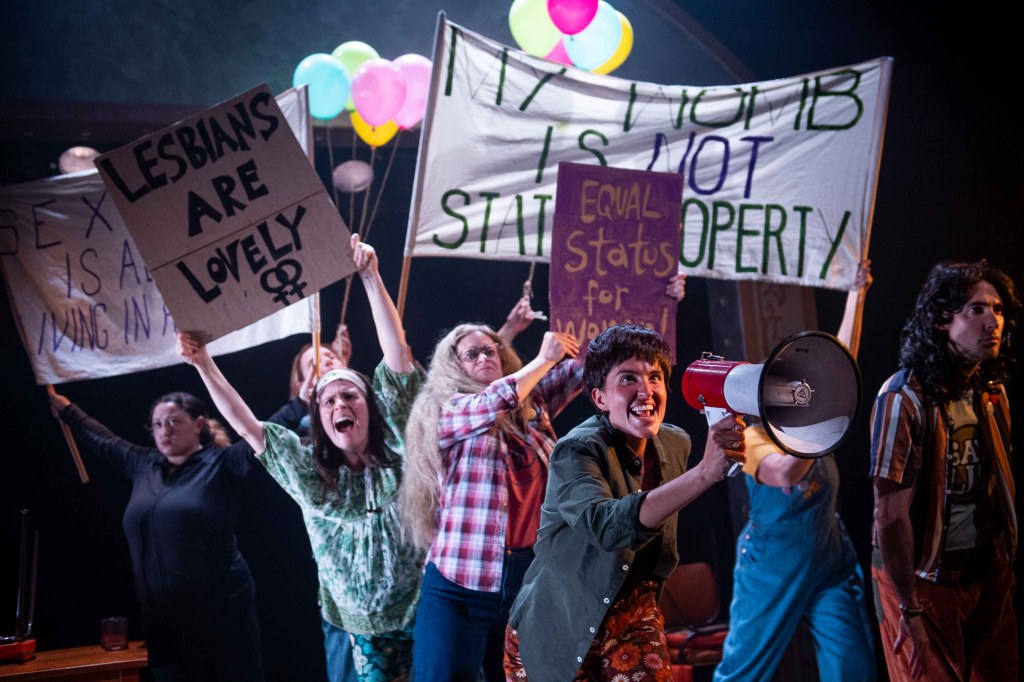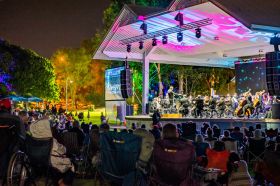During the 1960s and 70s, patients at Chelmsford Private Hospital, in Sydney’s north-west, underwent ‘deep sleep therapy’, meaning, they were knocked unconscious with barbiturates for sometimes weeks on end and left incontinent in their beds. They were also given electroconvulsive therapy in an attempt to ‘cure’ them of depression, schizophrenia, addiction and same-sex attraction.
This is one of the dark and shameful moments of our not-so-distant past explored by CAMP, a new play from Siren Theatre Co and Seymour Centre in association with Sydney WorldPride. Written by emerging Australian voice Elias Jamieson Brown, it portrays the history of Australia’s gay rights movement, told through the stories of some of the groundbreaking activists who risked their lives for political and social reform.
It is a historical exploration set against the backdrop of the Vietnam War, but it also acknowledges the struggle for the rights of the LGBTQIA+ community is, sadly, not over. A resurgence in far-right extremism, religious fundamentalism and anti-trans sentiment demonstrates the fight continues to this day.
After a slightly stiff beginning, CAMP chugs along at a solid pace. The actors breathe life into their characters with gusto, drawing the audience into their battle to gain recognition and autonomy as a community, but also at the micro level through an examination of the intricate and fraught interpersonal relationships between them.
Tamara Natt gives a standout performance as young mother Jo, who has been deemed unfit to raise her children because of her sexuality. Adriano Cappelletta is striking as Dave, the sole gay man in the group. Lou McInnes captures the vulnerability of young Tracey, a traumatised survivor of the Chelmsford psychiatric hospital’s horrific gay-conversion therapy. One notable effective and affective strategy was the positioning of Tracey’s older, more world-weary self (Sandie Eldridge), watching her more idealistic younger self from the side of the stage.
Under the skilful guidance of director Kate Gaul and movement director Emily Ayoub, the actors make clever use of the stage. Changes in scenery are crafted into performances themselves, with the actors’ movement of props accompanied by a soundtrack reminiscent of 1970s action TV shows. Slow-motion sequences are effective at highlighting dramatic points in the show.
The characters often look out into the theatre when having conversations with one another – a fourth wall-breaking technique used to highlight crucial points in the dialogue. These Brechtian devices also work cleverly to situate the performance in the theatre of the era it depicts.
The stage is transformed from the headquarters of CAMP to a bar, a hospital and the streets of Sydney, where the pivotal demonstrations took place. Projections displaying place names and dates keep the audience informed as to where in time the action is positioned. This complements the action, spotlighting characters having intimate conversations, and using sudden drops to darkness for dramatic effect.
Read: Book review: Shirley, Ronnie Scott
Quick witted and comical, but also deeply moving and, at times, harrowing, CAMP carries a powerful political message and a warning to learn from our past. In this period of deep political and social fissures, it is an invitation to reflect on what kind of society we want to be.
CAMP by Elias Jamieson Brown
Seymour Centre
Director and producer: Kate Gaul
Associate director: Hayden Tonazzi
Associate producer: Robyn Kennedy
Production designer: Angelina Meany
Lighting designer: Morgan Moroney
Movement director: Emily Ayoub
Composer and sound designer: Jessica Dunn
Cast: Tamara Natt, Adriano Cappelletta, Lou McInnes, Sandie Eldridge
Tickets: from $36
CAMP will be performed until 4 March 2023.





